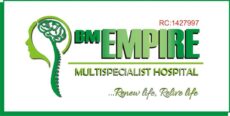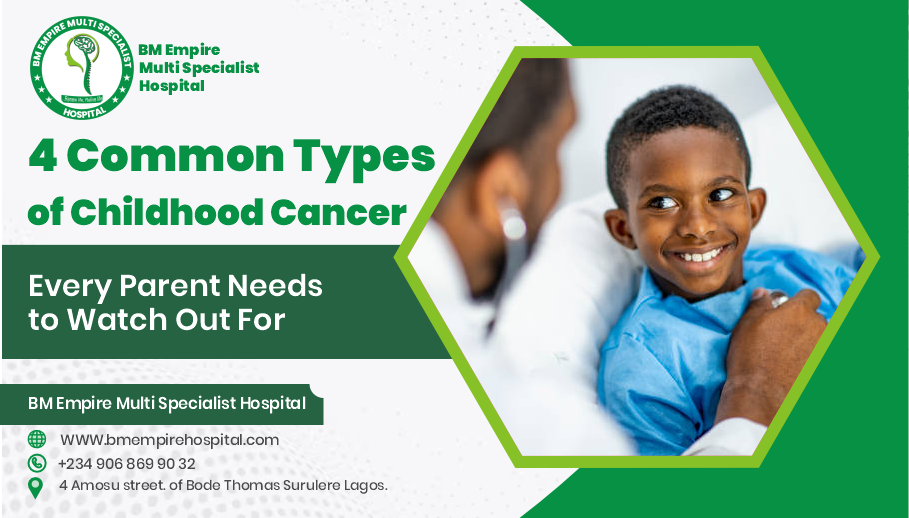As parents, our children’s health is our top priority. We worry about everything—from the food they eat to the friends they keep. But one topic that often gets overlooked until it’s too late is childhood cancer. While it’s not something any parent wants to think about, being informed can make all the difference. Early detection and treatment can significantly improve outcomes, and that’s why it’s crucial to know the common types of childhood cancer and their warning signs.
At BM Empire Hospital, located in the serene area of Bode Thomas, Surulere, Lagos, we understand how overwhelming it can be to think about your child facing such a challenge. With our modern facilities, including an ICU, HDU, and state-of-the-art diagnostic equipment, we’re here to provide the best care possible. Our team of licensed consultants, both in Nigeria and the USA, is dedicated to supporting families through every step of their journey.
Here are 4 common types of childhood cancer every parent should be aware of:
1. Leukemia
Leukemia is the most common type of childhood cancer, accounting for about 30% of all cases. It affects the blood and bone marrow, leading to symptoms like fatigue, frequent infections, bruising, and pale skin.
Imagine your child, who used to be full of energy, suddenly becomes unusually tired and pale. They might also complain of bone or joint pain. While these symptoms can sometimes be mistaken for common childhood illnesses, persistent or worsening signs should prompt a visit to the doctor.
2. Brain and Central Nervous System (CNS) Tumors
Brain tumors are the second most common type of childhood cancer. These tumors can cause headaches, nausea, vomiting, dizziness, and even changes in behavior or vision.
Picture this: Your child starts complaining of frequent headaches, especially in the morning. They might also experience sudden vision problems or difficulty balancing. These symptoms can be subtle at first, but they shouldn’t be ignored, especially if they persist or worsen over time.
3. Neuroblastoma
Neuroblastoma is a cancer that develops from immature nerve cells and typically affects children under the age of 5. It often starts in the abdomen, causing swelling, pain, and changes in bowel habits.
Think about your toddler, who suddenly develops a swollen belly and seems to be in pain. They might also have trouble walking or complain of bone pain. While these symptoms can sometimes be mistaken for common childhood issues, they could also be signs of neuroblastoma.
4. Wilms Tumor (Kidney Cancer)
Wilms tumor is a type of kidney cancer that primarily affects children between the ages of 3 and 4. Symptoms include a noticeable lump or swelling in the abdomen, fever, pain, and blood in the urine.
Imagine you’re giving your child a bath and notice a unusual lump in their belly. They might also complain of stomach pain or have a fever that doesn’t go away. These symptoms can be alarming, and it’s important to seek medical attention as soon as possible.
What Should You Do If You Notice These Signs?
First, don’t panic. Not every symptom means cancer, but it’s always better to be safe than sorry. If you notice any persistent or unusual symptoms in your child, consult a healthcare professional immediately. Early diagnosis and treatment can make a world of difference.
At BM Empire Hospital, we’re equipped to handle pediatric cases with care and expertise. Our in-house pharmacy, lab, and ambulance services ensure that your child receives comprehensive care under one roof.
Final Thoughts
Childhood cancer is a tough topic, but knowledge is power. By staying informed and vigilant, you can protect your child’s health and ensure they get the care they need if something goes wrong.
If you have any concerns about your child’s health, don’t hesitate to reach out to BM Empire Hospital. We’re located at 4, Amosu Street, Off Bode Thomas, Surulere, Lagos. You can call or WhatsApp us on 09068699032, or visit our website at Home .
Your child’s health is our priority. Let’s work together to keep them safe and healthy!
Disclaimer: This article is for educational purposes only and should not replace professional medical advice. If you have concerns about your child’s health, please consult a qualified healthcare provider.

